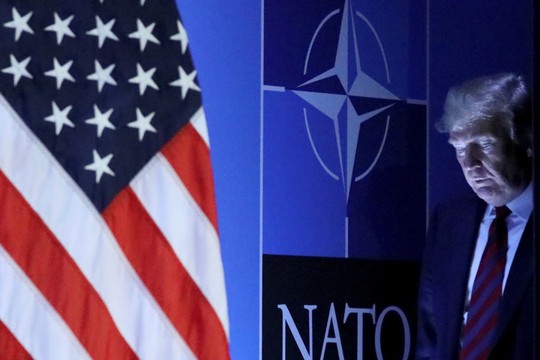Photo: CEPA
The guardrail against the next USA president leaving the NATO alliance is shakier than you think, notes POLITICO.
In the wake of NATO-skeptic President-elect Donald Trump’s victory, backers of the alliance are taking comfort in a year-old U.S. law that says he can’t withdraw unless Congress approves.
But Trump may have a way around it — and it’s a method he has used before.
In 2023, Sens. Tim Kaine (D-Va.) and Marco Rubio (R-Fla.) authored legislation requiring that any presidential decision to exit NATO must have either two-thirds Senate approval or be authorized through an act of Congress. Lawmakers passed the measure as part of the fiscal 2024 National Defense Authorization Act, which President Joe Biden signed into law.
Legal experts warn that Trump could try to sidestep Congress’s NATO guardrail, citing presidential authority over foreign policy — an approach he used before to bypass congressional restrictions on treaty withdrawal.
Meanwhile, Trump could undermine NATO without formally leaving. Democratic lawmakers have warned that he could refuse U.S. support by withholding ambassadors or keeping troops from participating in military exercises. While several lawmakers in February called for new legislative measures to guard against these risks, nothing serious has materialized since.
“Following Trump’s threats in his first term, the Congress — recognizing the vital importance of NATO — acted on a bipartisan basis to prevent any future presidents from unilaterally withdrawing,” Sen. Chris Van Hollen (D-Md.), a member of the Senate Foreign Relations Committee, said in a statement. “While Trump may resort to his old tricks, we’ll continue working to shore up NATO and stand ready to fight back against any attempts to undermine the strength of this alliance.”
Asked to comment, Trump spokesperson Karoline Leavitt said in a statement, “The American people re-elected President Trump because they trust him to lead our country and restore peace through strength around the world.”
A NATO spokesperson did not reply to a request for comment.
Because NATO runs on the confidence of allies, former alliance officials said that signaling an exit is as good as leaving. “De facto the day you send the letter it is in a way effective immediately,” said Camille Grande, a former NATO assistant secretary general and now a distinguished policy fellow at the European Council on Foreign Relations. “Because what you’re saying is ‘I’m no longer committed.’”
Beyond the legal aspects of withdrawing, the United States would have to figure out what to do with more than 100,000 U.S. troops stationed in Europe — a number that has grown by one-fifth since Russia’s full-scale invasion of Ukraine more than two years ago. The Defense Department might also have to pull out of NATO’s military command structure, which has been run by an American general dating back to its establishment under then-Gen. Dwight Eisenhower in 1949.
“We are not sort of having a discussion in very quiet times where there is a guy in the White House who’s not a strong believer in alliances and in old-fashioned NATO,” Grande said. “We have a war in Europe. We have a serious concern for many Europeans that the confrontation with Russia might escalate in some shape or form, and then where are we?”
Trump repeatedly criticized NATO allies during his first term for not meeting defense spending targets, openly suggesting reduced U.S. support and even hinting at withdrawal. At a rally this year, he recalled telling allies, “If we don’t pay, are you still going to protect us?.. Absolutely not.”
Trump hasn’t said publicly that he would pull out of NATO, but reportedly has discussed it repeatedly in private. He did say on the campaign trail that he would “encourage” Russia “to do whatever the hell they want” to NATO allies who don’t spend enough on defense.
Trump told European Commission President Ursula von der Leyen in 2020 that the U.S. wouldn’t come to Europe’s defense if it was attacked, POLITICO reported. He has said NATO countries subsequently spent “billions and billions” of dollars on their defenses in the wake of his threat.
While critics argue the strong rhetoric is undermining the alliance, some Republicans view it as effective pressure that prompted NATO members to increase military funding.
read more in our Telegram-channel https://t.me/The_International_Affairs

 12:25 19.11.2024 •
12:25 19.11.2024 •























